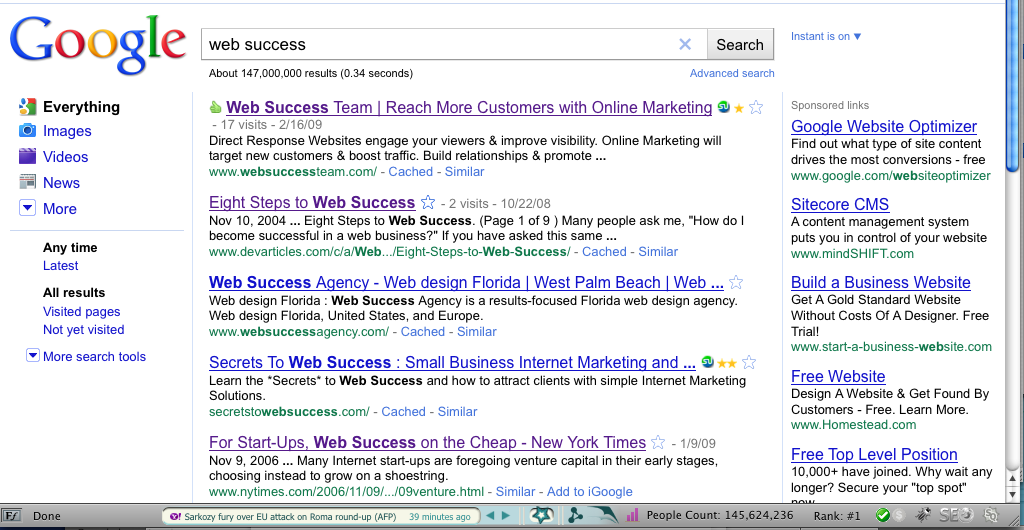16
Sep 2010
Turn Your Web Page Titles Into Marketing Hubs
By Janette Speyer, Web Success Team
When building a website we often forget page titles. We all know by now that content is one of the most important parts of a website. But if we don’t plan a title tag strategy we can loose a valuable sales opportunities.
Page titles are the first thing that the search engines see. Therefore, the better the page title the more likely search engines will correctly classify your page under the right keywords.
As the sample shows the title tag for our website is
“<title>Web Success Team | Reach More Customers With Online Marketing</title>”
Web Success Team is our branded keyword.
Reach More Customers With Online Marketing is our tagline using Online Marketing as a keyword. So it is displayed as a title tag in our home page.
It is a good idea to plan your title tags using a combination of branded keywords and search terms. You can find these on the webmaster tools on your Google account. You can also find out which search terms have the most click-thrus to determine a title combination using search terms and keywords. Ideally for best SEO practices, your title tag should match your <h1> title or the title of your page. They should relate to the content at hand.
The Importance of Good Titles and Making Them Effective
Although searchers see the page title second, it is important to maintain good titles. This is because many surfers will still decide on whether or not to link to or bookmark your site based on your page title. Page titles are the default text for bookmarks and also store in surfers’ browser history. When viewers bookmark your site, they want the page title to be short and descriptive. Otherwise the bookmark will be useless to both of you and you will lose a return visit.
Often times RSS generators turn your page titles into headlines. Therefore, if your page title is not descriptive or relevant, you could lose viewers. Many people who link to sites often use the page title as their anchor text, which helps Google rank relevant keywords for your site.
Now that we’ve established the importance of page titles, this is how you make them successful. Keep your page titles short and descriptive using only one or two keywords. More than two keywords and you run the risk of overloading search engines and getting your page blocked. Pick a title for every page of your site. Yes, every page! This will force the search engines to look at every page instead of marking one or two pages as duplicate material.
Write plainly and cut out extraneous phrases. The road to success is a simple one. Do not stuff your titles with tons of keywords and unnecessary phrases. The words “click here” are virtually useless in today’s online marketing, cut it out and replace it with something that has more weight. Instead of “Click Here for a FREE Consultation,” use “FREE Consultation.” Let’s say you are writing an article about how to save money teaching abroad. A good title would be, Get Paid to Travel the World and Help Children.
With the Internet, fast paces and small attention spans are dominant. Therefore, create a title that is simple and to the point. Be creative and try to stir up emotion or intrigue within your readers. Remember, you have two, not one, chance to do so with both page and article titles.
About the Author: Janette Speyer is an online marketer, social media strategist and co-founder of the Web Success Team. You can follow Janette on Facebook, Twitter and LinkedIn.













September 19th, 2010 8:10 /
Thank you Janette, that’s very good advice. Tag titles, taglines, page titles and appropriate keywords are so important in website seo and are definately things to focus on. Considering how costly paid traffic can be, it’s an absolute must, to learn and apply the best seo methods we can find to direct free traffic to our sites.